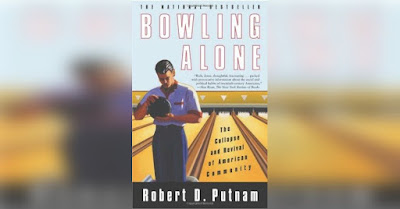Back in 2000 when Robert Putnam first published Bowling Alone, his landmark study of the decline of social and civic engagement over the previous 50 years, Masonic leaders jumped on it like ducks on a Junebug. His study began when he noticed that bowling alleys in the 1990s were doing a booming business, yet organized bowling clubs were vanishing. More Americans were bowling by themselves than ever before, but it was no longer the group-participation activity it had been for decades before. And the more Putnam and his Harvard team poked around, they found that pattern repeated over and over: Americans were turning in on themselves and choosing solitary pursuits, while shunning in-person groups, clubs, associations and group activities. People were more disconnected from family, neighbors, friends, and — perhaps most alarming of all — from civic participation in democratic institutions and activities than at any time before.
Putnam's study laid out the sobering truth in black and blue that nearly every in-person, voluntary associative organization — from the Red Cross and the Boy Scouts, to PTAs and card-playing clubs — had diminished in participation, size and influence. People were still technically joining clubs and groups, but they were most commonly distant, non-participation organizations like the Sierra Club, the National Rifle Association, the ASPCA, the International Fellowship of Christians and Jews, etc. Send them your credit card payment every year and you get an ID card, a bumper sticker, maybe a magazine subscription. But none of them place any demand on your time, effort or participation. And you sure don't get to know your fellow club members, much less go out for a beer with them.
Masonic leaders, in particular, could at least comfort themselves in knowing that our straight-line decline in membership ever since 1958 wasn't peculiar only to our fraternity. At least we weren't alone. And we still aren't. We're twenty years beyond Putnam's first examination of the issue, and our declining membership numbers have stayed on their same downward trajectory that started 63 years ago.
Putnam's book became a huge bestseller, and he popularized a social science concept called social capital: the shared values, norms, trust, and sense of belonging that make social interaction possible. Social capital is what binds people together for their mutual benefit. And when we share less and less in common with our neighbors and fellow citizens, society falls apart. (I also strongly recommend Charles Murray's outstanding book, Coming Apart.)
That brings us back to the mission of Freemasonry, which is to improve society by binding together men from all walks of life with shared concepts and philosophy, while avoiding sectarian and political differences that so frequently divide people, "to spread the cement of brotherly love and affection which unites us into one sacred band or society of friends and brothers, among whom should exist no contention, except that noble contention, or rather, emulation, of who best can work and best agree."
To join the May 21st webinar, see the Social Capital Research & Training website HERE. There is also a form to fill out in case you want to pose a question directly to Robert Putnam.





Related topics are discussed in the open access spring issue of Ritual: https://www.ipsonet.org/publications/open-access/ritual-secrecy-and-civil-society/ritual-secrecy-and-civil-society-volume-8-number-1-spring-2021
ReplyDelete